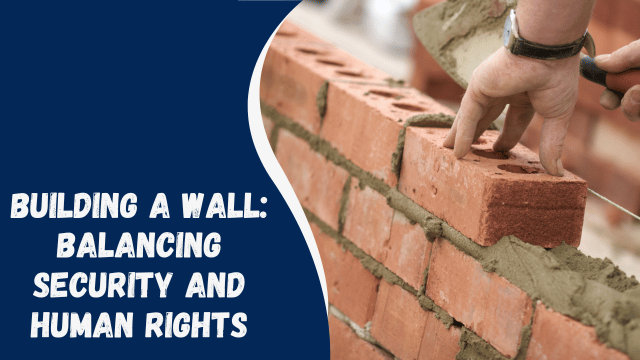Building a Wall: Balancing Security and Human Rights

In an era where migration and border security are hotly debated topics, the idea of building a wall to manage immigration has sparked intense discussions. The proposition to construct a wall with the aim of curbing illegal immigration raises complex ethical, legal, and humanitarian questions. This article delves into the multifaceted issue of building a wall and its potential violation of the rights of undocumented immigrants.
Contents
- 1 Introduction
- 2 Understanding Border Security
- 3 The Wall Proposal: Rationale and Concerns
- 4 Balancing National Security and Human Rights
- 5 Legal Implications and International Perspectives
- 6 The Humanitarian Aspect: Impact on Vulnerable Communities
- 7 Exploring Alternative Approaches
- 8 Public Opinion and Political Divides
- 9 Economic Considerations
- 10 Learning from Global Examples
- 11 The Power of Comprehensive Immigration Reform
- 12 Conclusion
Introduction
In recent years, the topic of constructing a wall as a measure to control the influx of undocumented immigrants has become a contentious issue. Advocates argue that such a wall would enhance national security by reducing unauthorized border crossings. However, opponents assert that building a wall could infringe upon the rights of millions of undocumented individuals seeking a better life in a new land.
Understanding Border Security
Border security is a crucial concern for any nation. It encompasses efforts to regulate the movement of people, goods, and services across national boundaries. Proponents of a wall argue that it could serve as an effective deterrent to illegal immigration and the flow of contraband. Yet, the feasibility and ethics of this approach are subjects of intense debate.
The Wall Proposal: Rationale and Concerns
The rationale behind building a wall lies in its potential to physically obstruct unauthorized entry. Advocates suggest that a fortified barrier would discourage individuals from attempting to cross the border without proper documentation. However, critics raise concerns about the economic feasibility, environmental impact, and long-term effectiveness of such a strategy.
Balancing National Security and Human Rights
The central challenge in the discourse surrounding a border wall is striking a balance between national security interests and the rights of undocumented immigrants. While securing borders is a legitimate concern, there are worries that a wall could lead to a militarized approach that disregards the rights and dignity of those seeking refuge or a better life.
Legal Implications and International Perspectives
From a legal standpoint, building a wall presents a host of challenges. International law recognizes the rights of individuals to seek asylum and protection from persecution. The construction of a wall could potentially violate these rights, leading to diplomatic and legal disputes on the global stage.
The Humanitarian Aspect: Impact on Vulnerable Communities
A significant concern is the potential humanitarian crisis that could arise from building a wall. Many undocumented immigrants come from vulnerable backgrounds, fleeing violence, poverty, or persecution. A wall might funnel these individuals into more dangerous routes or deter them from seeking assistance, putting their lives at even greater risk.
Exploring Alternative Approaches
Rather than relying solely on physical barriers, alternative approaches to border security have gained traction. These include investing in technology, increasing border patrol resources, and addressing the root causes of migration in countries of origin. Such comprehensive strategies aim to address security concerns while upholding human rights.
How to Create a Group Chat on Snapchat
Public Opinion and Political Divides
Public opinion on building a wall is often divided along ideological lines. The debate extends beyond practical considerations to questions about identity, culture, and national values. Bridging these divides requires nuanced discussions that take into account both security imperatives and humanitarian concerns.
Economic Considerations
Economic factors play a significant role in discussions about a border wall. The cost of planning, constructing, and maintaining a wall raises questions about resource allocation. Critics argue that these funds could be better used to invest in education, healthcare, and economic opportunities for both citizens and immigrants.
Learning from Global Examples
Examining examples of walls and barriers in other parts of the world offers valuable insights. Walls that divide territories often have complex consequences, affecting communities, relationships, and regional stability. These lessons underscore the need for holistic approaches to border management.
The Power of Comprehensive Immigration Reform
Ultimately, the debate over building a wall cannot be separated from the broader conversation about immigration reform. Comprehensive policies that address legal pathways, asylum procedures, and border enforcement have the potential to strike a balance between security and human rights.
Conclusion
In the complex landscape of immigration and border security, the proposition of building a wall to curb illegal immigration raises critical questions. While national security is paramount, it must be pursued in a manner that respects the rights and dignity of all individuals. As nations grapple with this challenge, a multifaceted approach that integrates security measures, international obligations, and humanitarian considerations remains essential.




